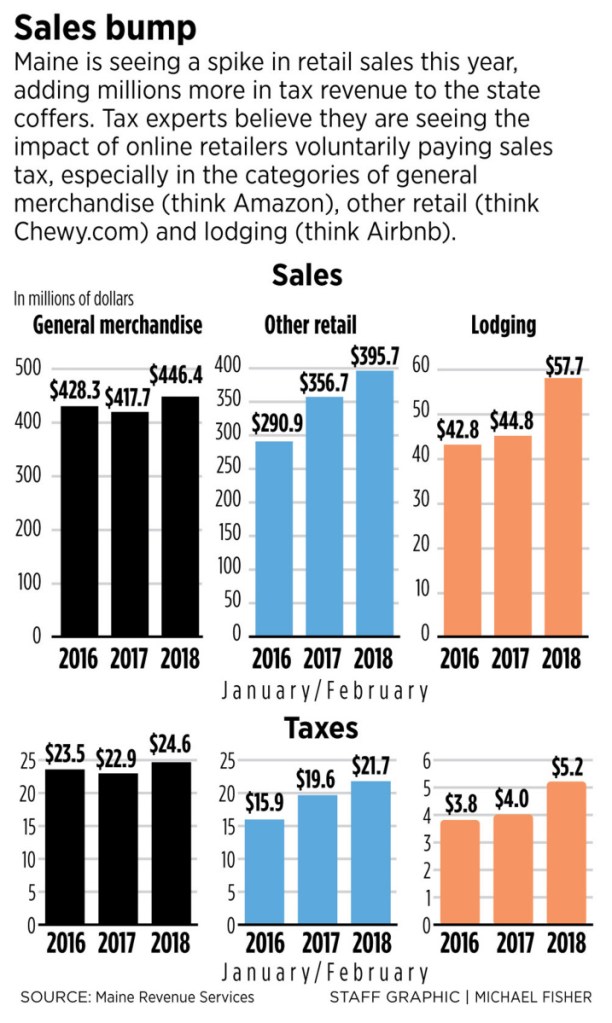State bean counters got a surprise this year: unusually vigorous winter spending on merchandise and lodging that seems fueled by online retailers.
In the first two months of 2018, sales of some merchandise and lodging grew by double digits, adding more than $4 million to the state’s sales tax coffers, compared with the same period last year.
Sales of jewelry, books, toys, pet products and other specialty items are up 16.5 percent compared to last year, lodging sales are up almost 29 percent, and general merchandise sales are up 7 percent, according to a Maine Revenue Services report released April 20.
State officials suspect online companies now collecting and remitting taxes are responsible for much of the sales growth in a historically slow retail period, said Michael Allen, associate commissioner for tax policy. Some of the growth is normal additional spending in Maine stores, he added.
“We were really shocked at how strong January sales were given the type of weather we had,” Allen said. “I guess if you are not going out to the mall, you might be sitting at the house in front of the fire with a laptop and buying stuff. People aren’t necessarily cutting back on the spending, just doing it in a different way.”
The surge of lodging sales during the darkest days of the winter indicates new revenue from online home-sharing sites, which are overshadowed by other accommodation outlets during the summer, fall and holiday seasons, Allen added.
“It will really change the way we need to start thinking about monthly sales when we think about that industry,” he said. “As we do this year-over-year comparison, businesses that were not previously in our system and now are are driving that growth.”
Online shoppers for years dodged state and local sales tax because under federal law, retailers do not have to collect taxes unless they have a physical presence, or nexus, in a state such as a store or a warehouse.
But pressure has built on companies to collect those taxes. A South Dakota lawsuit seeking to overturn the law governing remote sales is being considered by the U.S. Supreme Court.
Last April, online giant Amazon started to collect Maine’s 5.5 percent sales tax. At the same time, home-sharing platform Airbnb began charging guests the state’s 9 percent lodging tax.
A number of other online retailers have elected to charge Maine sales tax. But the state doesn’t have the ability to track how many online retailers have registered with the state, and the identity of companies that are voluntarily collecting tax is confidential, said David Heidrich, spokesman for the Department of Administrative and Financial Services. Shoe retailer Zappos and pet supplies outlet Chewy.com both say they collect taxes in Maine.
Precisely what impact taxable online sales have on the state’s bottom line is unclear because they are lumped in with sales from brick-and-mortar retailers. However, increased lodging sales and purchases of specialty products and general merchandise netted the state close to $4.6 million in extra revenue in the first two months of 2018 compared to the same time last year. In fiscal year 2017, $1.4 billion was collected from all sales and use taxes.
Many online retailers do not collect tax in Maine, which costs the state up to $20 million a year in lost revenue, according to Allen. Merchandise sales are a small portion of the state’s overall sales tax revenue, especially compared to automobile and building material sales, he added.
“We have to give credit to the companies that choose to comply with the law of the land and are accurately reporting sales tax to the state,” said Curtis Picard, president and CEO of the Retail Association of Maine.
The association, like the National Retail Federation, has fought for years to make online companies pay sales tax, arguing current laws unfairly disadvantage brick-and-mortar stores. Last year, Maine lawmakers passed a law drafted by the association to force remote sellers with more than $100,000 in sales or 200 transactions a year to collect state tax. The law was identical to the South Dakota measure that prompted the current Supreme Court case. It also pressured online sellers to begin collecting taxes, Picard said, adding that states could decide to come after companies for uncollected back taxes depending on the Supreme Court ruling.
“This isn’t an issue of if they collect, it is when,” he said. “Certain companies don’t want to be part of that issue, so they are being proactive and that is great.”
Amazon, Zappos and Chewy did not respond to emails asking if the new law influenced their decision to begin collecting taxes.
Under current law, consumers, not retailers, are required to pay sales tax, but most do not. Maine residents are supposed to pay a 5.5 percent “use tax” for out-of-state purchases on their income tax filing. But only 8 percent of tax filings reflected that tax in 2016, accounting for about $3.6 million in revenue, according to the state.
“The burden has always been on the consumer to self-report that tax, and everyone knows most people don’t report that,” Picard said. “It shouldn’t be on you or me to pay that tax just because we shop online.”
Peter McGuire can be contacted at 791-6325 or at:
pmcguire@pressherald.com
Twitter: PeteL_McGuire
Send questions/comments to the editors.




Success. Please wait for the page to reload. If the page does not reload within 5 seconds, please refresh the page.
Enter your email and password to access comments.
Hi, to comment on stories you must . This profile is in addition to your subscription and website login.
Already have a commenting profile? .
Invalid username/password.
Please check your email to confirm and complete your registration.
Only subscribers are eligible to post comments. Please subscribe or login first for digital access. Here’s why.
Use the form below to reset your password. When you've submitted your account email, we will send an email with a reset code.